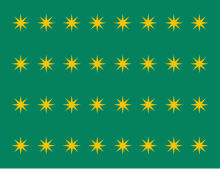
Back انتفاضة فينيان Arabic Alçament fenià Catalan Feniar matxinada Basque Éirí Amach na bhFíníní Irish Alzamento Feniano Galician
| Fenian Rising | |||||||
|---|---|---|---|---|---|---|---|
 Digital Recreation of one of the Fenian Flags used during the 1867 Rebellion | |||||||
| |||||||
| Belligerents | |||||||
|
| |||||||
| Part of a series on |
| Irish republicanism |
|---|
 |
The Fenian Rising of 1867 (Irish: Éirí Amach na bhFíníní, 1867, IPA: [ˈeːɾʲiː əˈmˠax n̪ˠə ˈvʲiːnʲiːnʲiː]) was a rebellion against British rule in Ireland, organised by the Irish Republican Brotherhood (IRB).
After the suppression of the Irish People newspaper in September 1865, disaffection among Irish radical nationalists continued to smoulder, and during the later part of 1866, IRB leader James Stephens endeavoured to raise funds in the United States for a fresh rising planned for the following year.
However the rising of 1867 proved poorly organised. A brief rising took place in County Kerry in February, followed by an attempt at nationwide insurrection, including an attempt to take Dublin in early March. Due to poor planning and British infiltration of the nationalists, the rebellion never got off the ground. Most of the leaders in Ireland were arrested, but although some of them were sentenced to death, none suffered execution. There followed a series of attacks in England aimed at freeing Fenian prisoners, including a bomb in London and an attack on a prison van in Manchester, for which three Fenians, subsequently known as the Manchester martyrs, were executed in November 1867.